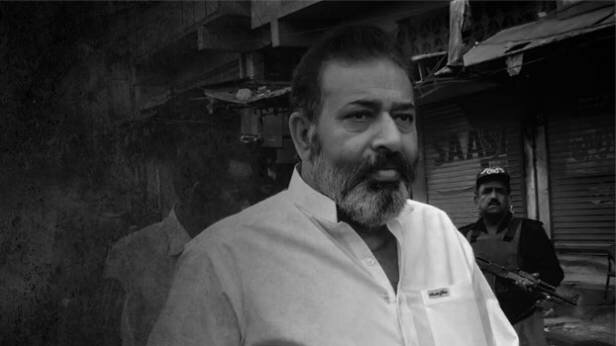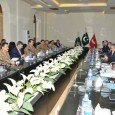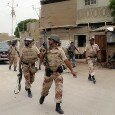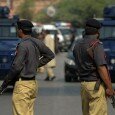By Tariq Habib –
Investigations into the recent assassination of SSP Choudhry Aslam remain inconclusive, while a tumultuous career is brought to an end
The man, dressed always in white cotton shalwar kameez with open front buttons, was Muhammad Aslam Khan. This style earned him the name ‘Choudhry’. Aslam became a part of history when he died in a recent attack. Law enforcers collected parts of his shattered body and took them to the hospital.
Investigations into the incident have been revealing more and more critical information with every passing day: at first it was believed that the blast that took Chaudhry Aslam was caused by an IED, but later, investigation agencies concluded it was a suicide attack.
Chaudhry was born in 1963 in Dodial, along the Karakoram highway, some 15km north of Mansehra, and was educated locally at primary level. After this, his brother Mohammad Khalid told Pique he left Dodial to settle with his father in Karachi. “I have no words to say about my brother, other than to say he was a brave child and a shining student at school. He spent his entire life as a brave man,” Khali said.
Joining as ASI in 1984 at the age of 21, Chaudhry became the inspector and station house officer for the Kalakot police station in 1991 and then SHO for Gulbahar in 1994. He later served in a number of police stations of the city.
Perhaps unsurprisingly, his clean-up operations meant he was also on the hit lists of several criminal groups targeted by his efforts. Gulbahar was perhaps the worst station he served in, given that the town had become a hotbed of terrorist activity that few other police officers were willing to tackle.
Aslam played a vital role in the investigations following the murder of former Governor Sindh Hakeem Saaed. He arrested MQM member Solat Mirza on his return from South Africa in 1999. Mirza was also convicted for murdering the then managing director of KESC, Shahid Hamid. More than 195 police officers who participated in the operation were killed in the last decade.
Chaudhry also arrested the underworld don Shoaib Khan in 2005, as well as his gangsters from different areas of Karachi. Shoaib Khan later died reportedly due to heart attack.
More recently, he headed the Lyari Task Force and went on to clampdown on the mafia run by Lyari gangsters Abdul Rehman (alias Dakait) and Arshad Pappu. Dakait was eventually killed in an encounter by a police team headed by Aslam in 2010.
Chaudhry received both criticism and acclaim from different parts of society throughout his professional life. He was known as a brave officer for his no-nonsense attitude towards criminals, while others doubted his credentials.
Some sarcastically deemed him an ‘encounter specialist’, a ‘shooter of bureaucrats’, as well as a puppet of various government figures. Aslam faced his first major controversy when Shoaib Khan died in jail, with some accusing the officer of poisoning; an allegation he later faced in court.
Aslam was himself jailed by order of the Supreme Court, from July 2006 to December 2007, for the alleged killing of Rasol Bux. Aslam had mistakenly identified Bux in an operation, and was later proved wrong when the man killed turned out to be a poor farmer from Sindh.
It is, therefore, unsurprising, that a number of assassination attempts were made on Aslam. He was targeted by MQM members following the arrest of MQM activist Ijaz Gorchai (alias Kala Munh) who was later convicted of carrying out over 100 murders. Aslam recognised him among those who attacked his convoy in the area of Punjab colony, an attempt made on the instructions of Ajmal Pahari. Pahari later confessed to his plot to assassinate Aslam.
In 2011, he escaped another attack on his residence, which tore off the building’s façade. At the time of the attack, Aslam, his wife and children were at home. Even though the front of the house was blown away, luckily, all of his family members escaped serious injuries. Last year he survived a bomb attack in a place not far from this latest, fatal attack. Karachi Deputy Commissioner Matanat Ali was also injured. Intelligence sources said that Aslam survived because the terrorists mistook the deputy commissioner’s vehicle for his.
Aslam also faced challenges within the force, when he was accused in court of giving promotions to junior officers out of turn. He defended his decisions, arguing that the officers who received promotions had served gallantly in the war against terrorism. However, they were ultimately taken away by the apex court’s judgment. Though the bureaucracy later managed to accommodate Aslam’s decisions, one harsh lesson he learnt during his life was that the writ of the law reigns supreme.
Despite these misdemeanours, Chaudhry was awarded the Pakistan Police Medal, Qauid-e-Azam Police Medal and the Tamgha-i-Imtiaz. During his service, he was also given Rs.1.4 million as a reward for eliminating and arresting numerous terrorists and criminals.
Investigations into the incident that took Aslam’s life continue, with CID officers claiming it was the result of a suicide blast, with more than 100kg of explosive material detonated. Meanwhile, bomb disposal experts took the view that it was a 20kg planted bomb. Later, investigators said that a suicide bomber, identified as Naeem Ullah, had rammed his driven a pickup, loaded with explosives, into the slain police officer’s bulletproof SUV.
But the case took a new turn when a taxi driver injured in the attack said in a statement that the pickup used for blast was standing on a jack with its tire removed. As soon as the police vehicle approached it, he said, the blast occurred.
In a further twist, it has emerged that the SSP had changed its bombproof vehicles for bulletproof ones just a few days before the incident. According to Aslam’s wife, Noreen Aslam, a colleague had exchanged Aslam’s bombproof vehicle for maintenance purposes. Noreen Aslam revealed that after the incident, the colleague in question did not even make a condolence call. Karachi police are currently interrogating the officer, with sources claiming he holds significant influence within the Sindh government and is very close to former president Asif Ali Zardari.
Just a few minutes after the attack, the Pakistani Taliban claimed responsibility for the incident. The Karachi Police have so far not named Abdul Wali (alias Omar Khalid Khurasani) nor his spokesman Sajjad Mohmand as suspects in the case, despite growing speculation about their involvement. Instead the police have named the Afghanistan-based Maulana Fazlullah and the TTP central spokesman Shahidullah Shahid as prime suspects.
Experts are divided into two groups in the ongoing investigation. One group claims it was a suicide attack. In Karachi, two other blasts were orchestrated along the same lines: one in March 2006 at the American Consulate, the other at Aslam’s house in September 2011.
Those who doubt the veracity of the suicide attack theory posit the taxi driver’s statement as their main source of doubt. They also add that the damage to Chaudhary’s vehicle is inconsistent with what they would expect from such an action. Furthermore, they argue that the quantity of explosives said to have been used would have resulted in substantial damage to cars both in front and behind Aslam’s.
Police and intelligence sources also note that Aslam was readying to begin the third phase of his crackdown, and that heavy political pressure is now interfering with the investigation, leaving some worried that the truth about the incident will be further distorted.
“It seems that the bomb was planted in or under the vehicle of the slain SSP”, claimed one intelligence source, adding, “The presence of explosive material in the vehicle could not be ignored”.
Sources within the Sindh police said that a special team of the military intelligence and Federal Investigation agencies were helping with the investigation.“The FIA also collected the data of phone calls made from the Essa Nagri neighbourhood and members of Chaudhry Aslam’s team to find out the possible involvement of any TTP sympathiser in the police force,” the source claimed.
He said that the attack showed that there were “black sheep” within in the police force, who had tipped off the militants about Chaudhry Aslam’s routes.The said agencies are also investigating employees at the home and office of the late SSP, as well as motorway police personnel.
Chaudhry is survived by his four children, Mnahil, Ikrash, Azan and Jazi, and his wife Noreen. Atta Ullah Khan Essakhailwy, the renowned folk singer, was his best friend and participated in family functions, particularly the birthday parties of his son.
“He was a cool and caring husband and a loving father,” Noreen said, adding that he was always available to discuss even minor problems with his children. Recalling the horrible story of the incident in which her husband was killed, she said: “He came home after a successful raid. I was out when he woke up and when I came back, he was ready to leave again, and said he would drop children to school by himself,” she said.
“He then said he had to go to work as he’d received a call. After a while, he called me and told me he was able to take a break, and wanted to meet with me. I told him I was not in the mood, and shortly after that I heard a loud explosion,” she said.
“Our lives were not like those of normal people as we never felt safe. He said that the protection of our children is the government’s responsibility, but he thought we should send them abroad for higher education so that they can serve the country better afterwards,” Mrs. Aslam said.
“We never got time to enjoy life. He was on a mission for the past 17 years, on call of duty.”
The writer is a journalist based in Karachi






























































































